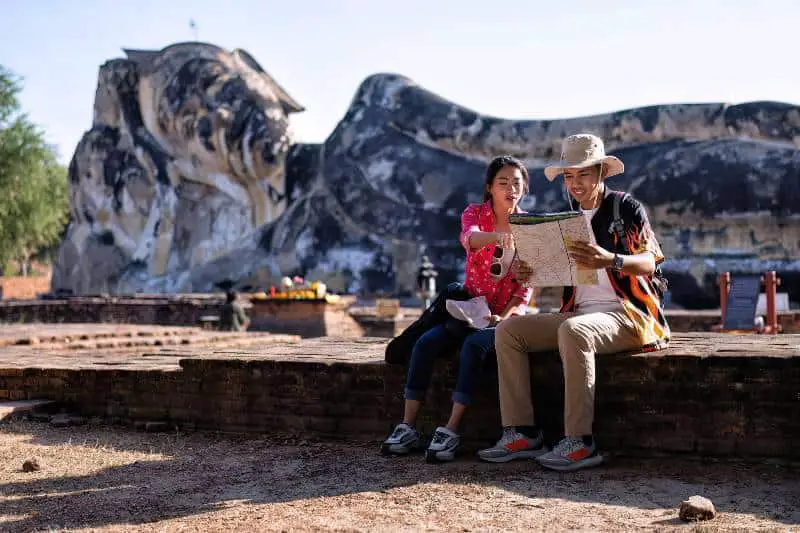Building a Support System in Thailand: Tips for Expats
Moving to another country is a challenging but rewarding experience. It can be hard to leave family and friends behind, but with determination and an open mind, many ex-pats view it as the start of a great adventure. For those moving to Thailand, there are undoubtedly a variety of more practical considerations that may need to be addressed.
From cultural differences to language barriers, the task of adjusting can bring some hurdles beyond simply feeling homesick. That’s why having access to a strong support system is so essential for navigating these challenges during your time in Thailand. Having support from family members or friends who understand what you’re experiencing can make the process much easier and give you peace of mind throughout your journey in the Land of Smiles.
As the population of aging adults continues to grow worldwide, it is essential for family and friends in Thailand to build a strong support system for ex-pats. New research data shows that living alone and experiencing social isolation are common issues among adults and older generations – trends expected to rise over time.
Key Takeaways
- It is important to build a strong support system in Thailand, either through family or friends, as it can help during difficult transitions.
- Social isolation is an issue that many aging adults face and should be addressed collectively.
- Connecting with ex-pat communities (both online and offline) can further aid the process of adjustment when moving to Thailand.

Why Building a Support System is Important
Building a support system is important for ex-pats in Thailand since it can help them to adjust to their new lives. It can also help them to avoid feeling isolated and homesick, which are two common feelings that many ex-pats experience when they move to a new country.
Having a support system will allow you to meet new people and make connections with people who have similar interests. These connections can help you feel more at home in your new country. In addition, having friends who have similar interests can help prevent you from feeling isolated when you’re away from home.
Building a Support System in Thailand
Joining ex-pat groups
Thailand is a great place to live, but it’s not easy at first. It’s a big change from your home country, and you may struggle for the first few months. One of the best ways to make this transition easier is to join an ex-pat group.
Here are some tips on how to choose the best one for you:
There are three main types of ex-pat groups: social, business, and networking. Social groups can be great if you’re looking for friends or want some extra support during your first few months in Thailand. Business groups are useful if you want to meet with other entrepreneurs or professionals who can help you get started with your new business or career path here in Thailand. Networking groups are perfect if you’re looking for someone who might be able to refer work opportunities or give you advice on how they’ve succeeded as an entrepreneur in Thailand (and vice versa).
Joining an ex-pat group offers many benefits that can help make your transition into Thai society much easier than it would be otherwise:
- You will have access to a network of people who have already been through what you’re going through now, so they can offer valuable advice about navigating daily life in Thailand (e.g., transportation options).
- You’ll be able to find other people who speak English fluently, which can be very helpful when you’re trying to communicate with people who don’t speak your native language.
- You’ll have the opportunity to make new friends and meet potential romantic partners in a safe environment where everyone is on the same page about what they’re looking for (e.g., an English-speaking partner).
Joining local communities
Joining local communities and sports clubs can help make sure you don’t feel isolated when you first arrive. If you’ve just moved from the US or Europe, likely, most of your friends are back home. Having a few local people in your life will help make you feel less alone.
1. Expat groups – Expat groups are communities where you can meet other ex-pats and discuss common issues and concerns. These groups often provide networking opportunities, as well as medical services such as information about the local area. Some ex-pat groups also organize social events for members, such as dinners or parties.
2. Language schools – If you’re interested in learning Thai, language schools are a great place to start! Many language schools offer free or discounted classes for newcomers to Thailand, so it’s easy to get started on your language studies with no cost involved!
3. Online forums: These are websites where people can post questions and receive answers from other members. They usually focus on a specific topic or theme. For example, there are Facebook groups for ex-pats living in Thailand that discuss all kinds of topics ranging from public health care issues to what it’s like raising children here. Some online forums require you to pay to use their services or else you’ll need an invitation code from someone who already has an account.
4. Sports club – Joining sports clubs is one of the best ways to meet people in Thailand. Not only will you get exercise, but you will also have someone to talk to while you’re doing it! You can also join local cycling groups or even take up jogging if you want to get more involved with physical health in your community but aren’t interested in joining a team sport like soccer or basketball.
Benefits of joining local communities
The best way to make friends in Thailand is to join a local community.
Thailand is a country where people are very friendly, but it takes time to get used to the culture. The local communities provide great opportunities for ex-pats to make new friends.
Here are some benefits of joining local communities:
1. Meet new people and make friends: Local communities are filled with different types of people who have different interests and hobbies. So, if you like playing sports, joining a sports club will help you meet other people who play the same sport as you do. If you like cooking, joining a cooking class will help you meet other people who love cooking too!
2. Learn about Thai culture: There are many things about Thailand that foreigners don’t know about because they are not from here or because they just don’t care about learning about them until they move here permanently (like me!). So, joining local communities is one way we can learn more about Thai culture without going out specifically for this purpose alone (which can be expensive).
3. Make yourself feel more at home: If you’re new to Thailand, it’s natural that you’ll feel a bit homesick sometimes. This is especially true if you don’t have any friends here yet! Joining local communities can help you feel more at home in Thailand because they are run by Thais and other foreigners living in your area too.
Finding a language partner
Finding a language partner is one of the best ways to practice your Thai. It’s also a great way to make friends and connect with other ex-pats in your area.
Here are some tips on how to find the right language partner.
1. First, make some friends! Talk to people at coffee shops or bars, join social groups, and generally try to meet as many people as possible.
2. Look for someone willing to commit at least once a week for roughly an hour. You can find language partners online through sites like Craigslist or Facebook groups dedicated to finding language partners. Be sure that you both have the same expectations–are you looking for conversation practice or do you just want someone who will listen while you talk?
3. If you’re learning Thai at school, ask them if they know anyone who might be interested in helping out with conversation practice outside of class hours. This is a great way to get more personal attention than what’s offered in class settings!
Overcoming Cultural Differences
Cultural differences that ex-pats may encounter
Thailand places a high value on respectful relationships and hierarchical order. To build positive intercultural connections with Thais, make sure to demonstrate respect in your interactions by greeting those more senior or older than you first and speaking deferentially when communicating. Showing an understanding of the culture’s expectations can go a long way toward building strong working ties.
Thailand is renowned for its deep-rooted culture and respect for the monarchy. As a show of honor, locals never criticize or disrespect any members of the Thai government or the royal family – both in person and online as numerous cases have proven that it can lead to serious consequences such as lengthy prison sentences. Even money should be treated carefully since Thai bank notes depict images of the King; therefore stashing them away within your shoes doesn’t fit with their customs!
Harmony
It’s essential to remember the Buddhist faith when in Thailand and maintain respect for their culture. Posing with a Buddha statue or buying them as decorations is not only frowned upon but may result in the confiscation of these items by authorities. If you ever become frustrated, it’s best practice to take on an air of stoicism – smiling despite your internal emotions – this will greatly improve how locals perceive you while allowing tensions to cool off more quickly.
The collective is an integral element of Thai culture, as it plays a profound role in the lives of many locals.
In the West, individuals are often celebrated for their successes and individual preferences. However in Thailand, it’s a different story – personal needs are less important than those of the group they belong to. This means that any action or decision you make when dealing with an individual may have repercussions on a wider scale involving teams and even families!
Additionally, decisions can take longer as consultations within various groups will be necessary before something is agreed upon by the team or community leaders themselves. Understanding these cultural nuances could help build stronger relationships with Thai people while respecting their values at all times!
Tips for navigating cultural differences
Expats who are new to Thailand need to build a support system with the locals. This is especially important if you’re in a foreign country where the culture is different from your own. You may have different ways of communicating, and different customs, traditions, and values. Here are some tips for navigating these cultural differences:
1. When you’re in a new place, it’s easy to get frustrated with cultural differences. But remember that many of these customs and traditions have been around for generations. If you don’t respect them, you’ll be causing yourself more trouble than you need.
2. Learning the language
Learning Thai will help make connections with locals and build deeper relationships with them. If possible, try taking classes at a local university or community center before moving here full-time. It will also help you communicate with locals more easily when living here long term!
3. Learn more
Developing cross-cultural communication skills is also important. Taking time to learn about the country’s history and cultural norms will help you develop and better understand how people interact with one another so that you can get along better with them as well.
Challenges of Building a Support System in Thailand
Language barriers
One of the most difficult aspects of moving to Thailand is building a support system.
It’s hard to form friendships when you’re new in town and don’t know anyone, and it can be even harder to find someone who speaks your language. But there are ways to overcome these challenges!
Language barriers are one of the main problems that ex-pats face when they move abroad. Many people have trouble understanding Thai or learning enough words to carry on basic conversations with locals.
If you’ve always been a good communicator, however, this shouldn’t be too much of a problem for you—you just need to learn some new vocabulary. You could also try learning some basic phrases in Thai before coming over so that when you get here, you’re ready to start chatting with everyone!
Social isolation
Social isolation is one of the biggest challenges that ex-pats in Thailand face. Even if you’re surrounded by people, you might feel isolated because there’s a language barrier, or because your family is back home and you don’t have many local friends.
As an ex-pat in Thailand, it can be hard to make local friends. It’s not always easy to get out and meet new people, and even if you do make an effort to do so, there’s a chance that they won’t understand what you’re saying or vice versa.
If this sounds like you, then don’t worry! We’re here to help! Here are some tips for staying connected and building relationships with locals:
Find ways to connect with other ex-pats: There are lots of events designed for ex-pats in Bangkok (like the monthly Expat Fair) where you can meet other people who are also living abroad. You can also join an online community (like the Expats in Thailand Facebook group).
Learn Thai: This will make it easier for you when interacting with locals since most Thais speak English but prefer using their native language when communicating with each other.
Healthcare System
Thailand and the United States couldn’t be more disparate when it comes to health spending. In America, one-fifth of its GDP is devoted to healthcare costs; comparatively speaking, in Thailand only 4 percent goes towards medical expenses. But despite this disparity between countries’ financial commitments – both matters are connected: Thailands’s reform has been a deciding factor for keeping their related expenditures low yet providing much-needed coverage increases.
Reformers worked to deliver cost-effective healthcare solutions, utilizing tools like the Government Pharmaceutical Organization which offers generic medicines for public coverage, and compulsory licenses granting governments access to patented generics under World Trade Organisation legislation.
The Affordable Care Act sought to make healthcare more accessible for Americans while working to contain costs. Unfortunately, the public option, a government-backed health insurer with lower administrative costs and the potential to bring down costs among private insurers through competition, failed in the legislative process.
This was largely due to lobbying efforts from representatives of private insurance companies who ultimately ousted this beneficial mechanism for everyone. Despite its removal, the Thai Health Promotion Foundation remains dedicated to promoting affordable and equitable health care that is accessible to all.
Also, to ensure that health service delivery continues efficiently and safely during this pandemic, the Department of Medical Services, and the Ministry of Public Health along with guidance from the World Health Organization (WHO) and financial assistance from the government of Japan, have implemented a ‘new normal’ model. This model involves health workers working in all healthcare facilities in Bangkok as well as 12 Regional Health Offices across the country, to promote health security for local citizens while also reducing health-related stress caused by infrastructure-capacity shortages.
If you’re interested in learning more about the Thai healthcare system, check out our blog post on the topic.
Building a Support System in Thailand FAQs
Why is it important to have a support system when living abroad in Thailand?
When you live abroad, it’s important to have a support system. Not only will the people in your life be able to help you when you’re feeling lonely or homesick, but they’ll also be able to keep you grounded and remind you of who you are and what’s important. Having a support system is especially important for those who are living abroad in Thailand because the culture can be so different from where they come from.
What are some benefits of joining ex-pat groups in Thailand?
Living in Thailand can be a wonderful experience. The locals are friendly, and the food is amazing. However, ex-pats often have a hard time adjusting to life abroad because they don’t have a support system. Having someone who understands what you’re going through and can help you through the rough patches is critical for adjusting to life abroad.
How can I find local communities to join in Thailand?
Finding local communities can be difficult for ex-pats. If you’re coming to Thailand for work, you may have colleagues who are also new in the country and could benefit from a community of their own. Or maybe you’re just looking for some friends with whom to share your experiences.
If you don’t have any connections yet, there are some great ways to find local communities in Thailand. Here are a few:
– Attend events! The ex-pat community in Thailand is active, so many events are happening all over the country every week. From networking events to cultural gatherings, there’s something for everyone.
– Join an online community! Many ex-pat groups on Facebook can provide valuable advice and support as well as a sense of belonging with others going through similar experiences.
– Find a local school or university that offers courses in English and enroll yourself! You’ll meet other students who are interested in learning English as well as teachers who can help guide your studies if needed.
How can I find a language partner in Thailand?
Finding a language partner in Thailand can be difficult. Expats are often more comfortable with finding a teacher or tutor, but there are many benefits to learning from someone more your age and background.
The best way to find a language partner is to get involved in the community. Volunteer at a local school, church, or charity. You’ll meet lots of people this way and chances are that someone will end up being your language partner!
If you don’t want to volunteer for any reason, there are online websites specifically designed for finding language partners in Thailand. These allow you to connect with other ex-pats in the country who are looking for someone to practice their Thai with them and vice versa.
What are some benefits of having a mentor or coach when living abroad in Thailand?
In Thailand, it can be hard to make friends. Some people are reserved and don’t tend to open up easily. This is especially true if you’re a foreigner who doesn’t speak Thai. It helps to have someone who has been there before and can guide you through the process of building a support system in your new home.
A mentor or coach will help you find ways to meet new people, connect with those around you, and build community. They can also give you support services give you advice on navigating cultural differences that may come up as you try to make friends with Thais and other ex-pats in Thailand.
Conclusion
The importance of building a support system in Thailand for ex-pats cannot be overstated. From joining local communities to attending support groups and volunteering with charities, the benefits are too great to ignore. Not only can these activities help you form meaningful relationships and find emotional support when struggling with mental health issues, but they can also help boost your overall health services well-being!
Now that you know the importance of building a support system, why not make it your goal to seek out meaningful relationships and personal connections in a safe and supportive atmosphere? To learn more about living in Thailand subscribe to our newsletter for more information! Together we can work towards better mental health conditions and a better and sustainable future for all ex-pats in Thailand.





